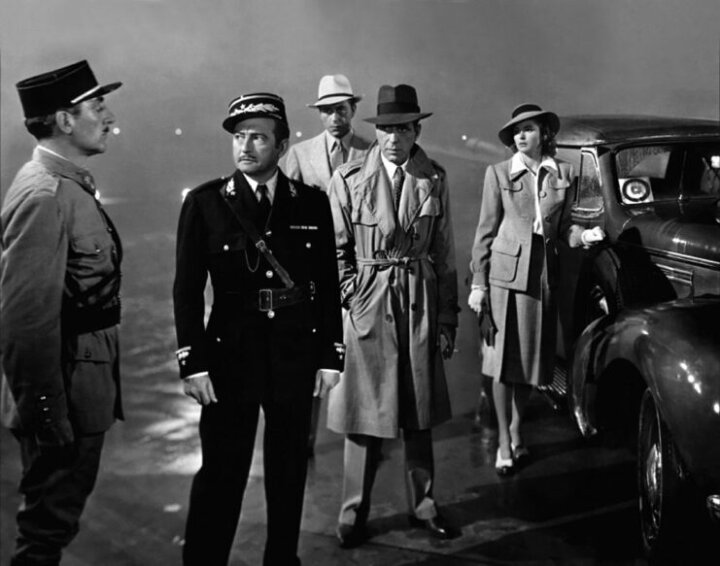Casablanca - 1942
Shot entirely on Hollywood sets, using studio actors, directors, and writers, the movie Casablanca perfectly displays the art of collaborative studio production, rather than the vision of the one creator. Even today it ranks on average third on the American Film Institute's best movies of the last 100 years, and it's probably the most famous Hollywood classic of all time. Certainly the most quoted and the most frequently cited as an all-time favorite, Casablanca won Best Picture, Director, and Writer awards at the 1943 Oscar ceremony.
Like Robert Ebert would have explained, it's about a man and a woman who are in love, and who sacrifice love for a higher purpose. It's indeed immensely appealing; the viewer is not only able to imagine winning the love of Humphrey Bogart (Rick) or Ingrid Bergman (Ilsa), but unselfishly renouncing it, as a contribution to the great cause of defeating the Nazis. No matter who the character that Bergman played truly loved, she had no easy life, and her fate is the most tragic in the movie.
Themes of the movies are: the difficulty of staying neutral or being non-involved, the inescapable past with pointers in the songs "As Time Go By" and "You must remember this", and the power of Lady Luck. At a crucial moment the movie impacted American perception of intervention in the Second World War, and of America's intervention in foreign affairs thereafter for good or wrong in general. Just remember the Ebert observation for it's also about a higher purpose, and moreover, Rick sends Ilsa away to safety afterall too.
The lessons that I've learned from the movie were: we're all made up from memories in the past, we really can't ever run from the reality, sometimes things don't go according to plan, and there's always something that we can learn, even through failures and lost. It's also important to note that Casablanca was quite groundbreaking in its explicit portrayal of an affair on-screen, and it shocked the world with its forbidden yet compelling love story!
[media=https://youtu.be/zMNodO6zP1U]
Like Robert Ebert would have explained, it's about a man and a woman who are in love, and who sacrifice love for a higher purpose. It's indeed immensely appealing; the viewer is not only able to imagine winning the love of Humphrey Bogart (Rick) or Ingrid Bergman (Ilsa), but unselfishly renouncing it, as a contribution to the great cause of defeating the Nazis. No matter who the character that Bergman played truly loved, she had no easy life, and her fate is the most tragic in the movie.
Themes of the movies are: the difficulty of staying neutral or being non-involved, the inescapable past with pointers in the songs "As Time Go By" and "You must remember this", and the power of Lady Luck. At a crucial moment the movie impacted American perception of intervention in the Second World War, and of America's intervention in foreign affairs thereafter for good or wrong in general. Just remember the Ebert observation for it's also about a higher purpose, and moreover, Rick sends Ilsa away to safety afterall too.
The lessons that I've learned from the movie were: we're all made up from memories in the past, we really can't ever run from the reality, sometimes things don't go according to plan, and there's always something that we can learn, even through failures and lost. It's also important to note that Casablanca was quite groundbreaking in its explicit portrayal of an affair on-screen, and it shocked the world with its forbidden yet compelling love story!
[media=https://youtu.be/zMNodO6zP1U]












